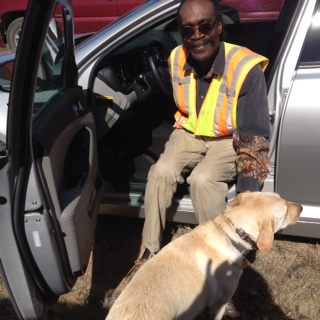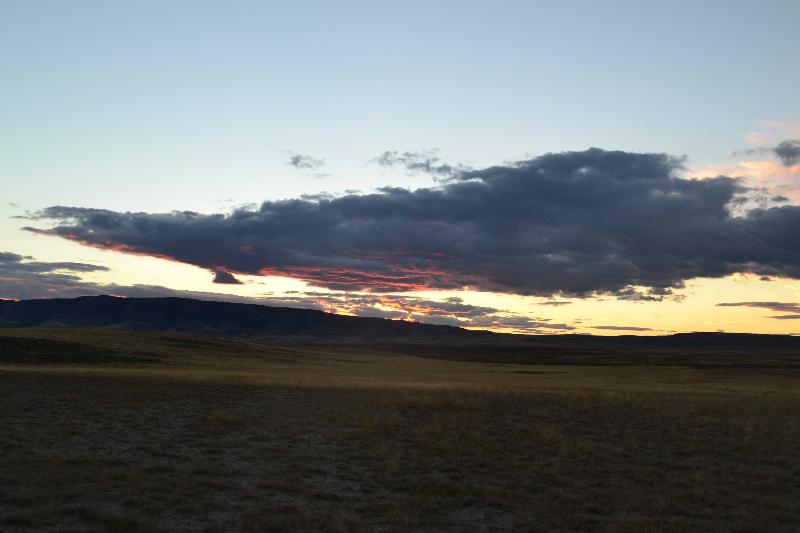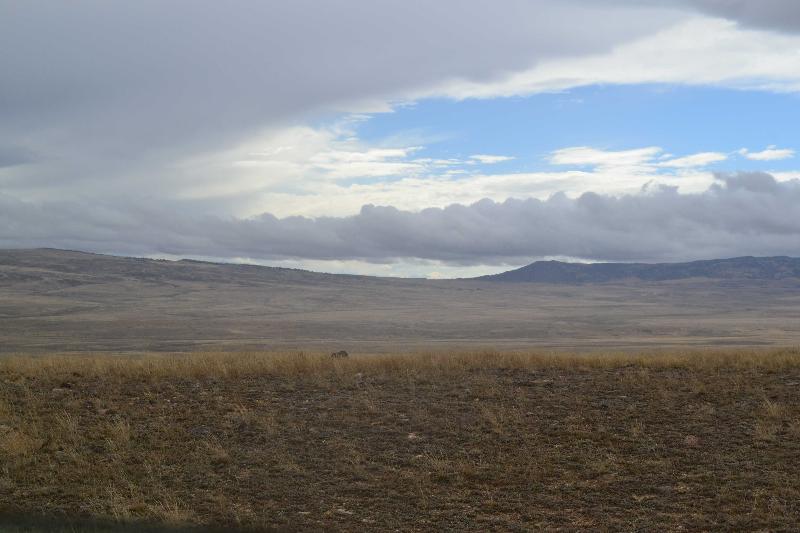Multiple Sclerosis Centers of Excellence
I Beat the Basin, Multiple Sclerosis Did Not Beat Me
Charles H. Cunningham -- Laramie County, Wyoming
How do I start this? First you have to ask yourself why would a man who has been diagnosed with MS since 1998 go on an antelope hunt that most professional hunters would not go out and try. I was an outdoors man before I was diagnosed with MS, before I joined the military, and to be honest, I have had a real hunting weapon in my hands since I was seven-years-old and I refuse to quit.

It had been 3 years since I had been hunting so I decided it was time to plan another hunting trip. Before I could think about hunting I needed to consider hunting with safety in mind. I felt I needed to safely get off of my prescribed pain medications, or as I call them “narcotics” to be sure I would be physically and mentally prepared for this kind of adventure. I shared with my doctor what I wanted to do and I set my mind to do it. You have to become your own advocate, because no matter what people say you have to fight for yourself. And it also helps to have a something important to work towards in order to meet your end goal. I am an outdoorsman and I wanted to get back out in the field.
It was a challenge to remove the “narcotics” from my life. It was not easy and it took me about a year to do it. It was a process “coming off” of the pain medications but I was supported by what I call “my family” (my friends and neighbors who I call family). In fact, I feel my neighbors truly stepped up by bringing me meals and providing emotional support to help me through this. (An interesting note, my neighbors are still supporting me with bringing meals, just to make sure I’m eating right.) They knew my goal was to be in a healthy place and physically fit to go on a hunting trip.
To physically prepare I did lots of training and workouts. Now you may ask, what kind of workouts did a man with MS do? Well, let’s see. I mowed three lawns once a week, I walked up and down my stairs for one hour once a week, and I did various arm weights to build up my arm strength.
When I refer to “hunting” I don't mean someone sitting me a chair and waiting for the game to come to me. I mean where I can go out, walk through the fields and forests, and hunt wild game. My goal was to hunt antelope in the Shirley Basin, aka: The Shirley Desert. I wanted to prove to myself and to the rest of the world that it can be done even though you have MS. My hunting partner had an obligation that left me to hunt alone for at least twenty-four hours. When he returned he found that I that I had one tag (one antelope). I felt very positive about what I was able to do on my own (of course, with support from my hunting partner).
When I think about this, it was only 18 months ago I was walking with a cane and now I am walking without one. I actually found this add in the "Momentum" magazine for a walking-aide. It was an advertisement for the "Bioness L-300 Leg lift set". I worked with my local VA and had it ordered and was fitted with this unit. This unit took away a lot of my leg pain and helped me with my walking. This unit was another step forward to meeting my goal of hunting game.
When the “hunt” day came, I remembered thinking that the first thing to expect is that my hunting partner will be late. You would think that he would have come over and helped me get everything loaded in the vehicle, but he knew I could do it and I did. By 0057 hours I had everything packed up except for the short grocery shopping list of items. And then I went on the “hunt” which I will share my thoughts about this event below.

It was opening day, and we decided to sleep in because setting up camp, especially a hunting camp, takes a lot work and for the most part a great deal of preplanning.
There I was sitting in the middle of the desert. One thing about the desert, especially when you are alone it gives you time to think. I was thinking, thank God I can still due this type of hunt, although my skills may not be as good as they use to be I really am thankful for being able to be outdoors in this environment. I was confident and felt very positive I can beat the Basin.
My hunting companion said something about seeing something flapping on the roof of my camper. I found the problem and had to come up with a plan to fix it. I used some geometry and physics principles and decided I could fix the vent on the top of my camper with the help of my truck. I just drove my truck up beside my camper, jumped in the bed of the truck creating easy access to the vent, and then “got er done.”
It was 1800 hours, and I just finished fixing the camper top and I decided to take a quick drive around to see the lay of the land. I then saw a small heard of antelope laying down about 700-900 yards out. I stopped the truck behind a small mound so it would be out of sight. I had my Browning Safari .308 and only three bullets with me because I wasn’t expecting to see any game at this time. However, I did find a young doe and was able to make the shot and filled Tag One. It was late and I had little daylight left to skin, cut up, and pack the meat on ice. I know many hunters just let their meat hang in the cool, but with my experience in public health I always go for the safest way to store the meat.
On day three of this hunt, I came to realize that this is going to be a “hard hunt” for game. However, just being in the outdoor and especially in the desert is a good experience and gives you a time to ponder and think about life. I found myself asking the question about “Why did I get MS?” and “Why did I have to alter my life for this disease?” But those kinds of questions can drive you crazy and really doesn’t pay off.

I decided to let those questions go and just listen to the sounds of the desert at night. Listening to the wind blow over the camper and listening to the light rain drops can be peaceful. Seeing the stars at night, especially when they are not faded out by city lights, is truly majestic. Then there is the ever so often shooting star which is a sight in itself. There were some vistas where you can see for thirty miles, especially on clear desert nights.
I thought that I already had a good hunt even though I only had the one tag filled. I was thankful for the ability to walk up to three and four miles a day. Even though I generally walked about three quarters of a mile then rested, I still was walking a lot. To me it proved that my preparation paid off and also the walk-aide was beneficial to help me accomplish my goal.
I felt that I did meet my goal of wanting be in the outdoors again, hunting and camping. I wanted to feel like an “outdoorsman” again even though I have MS. I feel I accomplished my goals and that “I beat the Basin and MS did not beat me.”
I think if other Veterans had a chance to experience the “the outdoors” and had a chance to hunt or fish or just experience the quiet and beauty of the outdoors that it would make a difference in their life. I wish I was worth millions so that I could take Vets out on these kinds of experiences. In the meantime, I do encourage people to get outdoors and enjoy nature.



















